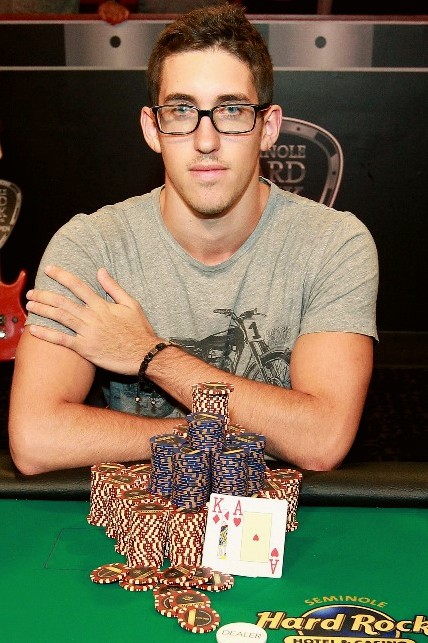






Poker Hand of the Week: 9/11/14You Decide What's The Best Play |
|
|
Give us your opinion in the comments section below for your chance at winning a six-month Card Player magazine digital subscription.
Ask any group of poker players how you played your hand and they’ll come up with dozens of different opinions. That’s just the nature of the game.
Each week, Card Player will select a hand from the high-stakes, big buy-in poker world, break it down and show that there’s more than one way to get the job done.
.jpg)
The Scenario
You are heads-up for a major tournament title and are already guaranteed a big seven-figure payday. You are a seasoned tournament pro with a lot of success both live and online. Your opponent is younger and is a well-known online heads-up specialist, but is currently in the middle of a huge live tournament heater.
With 21.2 million in chips, you have just over 70 big blinds to work with at the 150,000-300,000 with a 50,000 ante level. Your opponent has you slightly covered with 23.8 million.
You look down at 10 3
3 on the button and min-raise to 600,000. Your opponent calls and the flop is Q
on the button and min-raise to 600,000. Your opponent calls and the flop is Q 5
5 5
5 , giving you a flush draw.
, giving you a flush draw.
Your opponent checks and you bet another 600,000. Your opponent then check raises to 1.6 million. You call and the turn is the 3 , giving you a pair to go along with your draw.
, giving you a pair to go along with your draw.
Your opponent bets 2.8 million. The pot is currently 7.3 million and you have 18.95 million remaining in your stack.
The Questions
Do you call, raise or fold? If calling, what is your plan for non-heart rivers? What is your plan if you hit your flush? Does your position affect your decision? If raising, how much? Are you raising to induce action or to get a fold? What kinds of hands are in your opponent’s range given the action so far?

Daniel Colman
At the Seminole Hard Rock Poker Open and facing a 2.8 million bet from Daniel Colman, Mike Leah opted to call with his flush draw.
The river was the 9 , making a final board of Q
, making a final board of Q 5
5 5
5 3
3 9
9 . Colman bet 6 million and Leah took some time before calling with his 10
. Colman bet 6 million and Leah took some time before calling with his 10 3
3 for bottom pair.
for bottom pair.
Colman rolled over 9 5
5 for a full house and took more than a 3-1 chip lead in the match. Leah was eventually eliminated in second place, earning $1,047,638. Colman took down his third major tournament title of 2014, banking $1,446,710.
for a full house and took more than a 3-1 chip lead in the match. Leah was eventually eliminated in second place, earning $1,047,638. Colman took down his third major tournament title of 2014, banking $1,446,710.
What would you have done and why? Let us know in the comments section below and try not to be results oriented. The best answer will receive a six-month Card Player magazine digital subscription.
